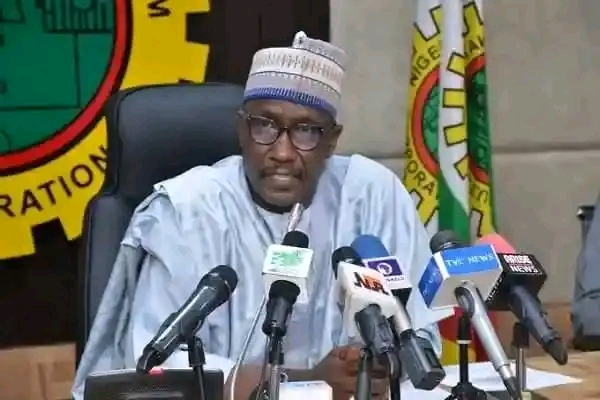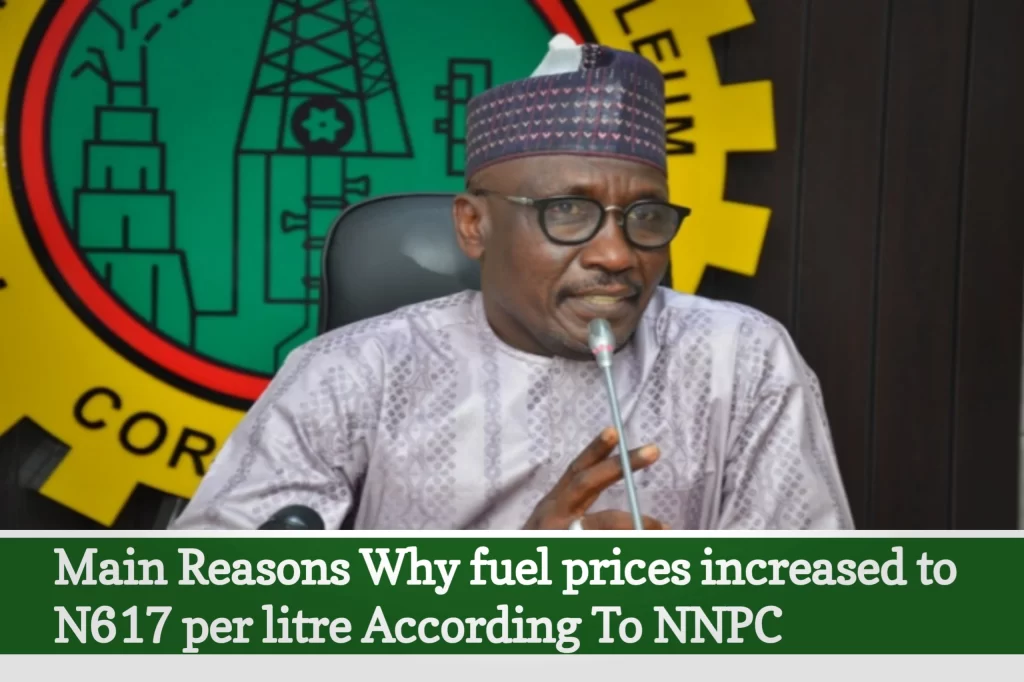Understanding the Surge in Fuel Prices: The Main Reasons Behind N617 per Litre, as Stated by NNPCL

Understanding the Surge in Fuel Prices: The Main Reasons Behind N617 per Litre, as Stated by NNPCL
Introduction:
The recent increase in fuel prices has been a cause for concern among citizens and businesses alike. The Nigerian National Petroleum Corporation Limited (NNPCL) has shed light on the factors contributing to the surge, leading to the current price of N617 per litre. In this post, we aim to delve into the main reasons behind this significant price rise as explained by NNPCL.

- Global Oil Market Dynamics
One of the primary drivers behind the increase in fuel prices is the global oil market dynamics. The international crude oil prices have experienced fluctuations due to geopolitical tensions, supply chain disruptions, and changes in demand patterns. Nigeria, being a major oil-producing nation, is susceptible to these market shifts, impacting the cost of refined products domestically.
- Depreciating Currency Value
The depreciation of the Nigerian Naira against major foreign currencies has been a critical factor contributing to the rise in fuel prices. As the Naira loses its value relative to the US Dollar and other currencies, the cost of importing refined petroleum products increases. This, in turn, puts upward pressure on local fuel prices.
- Subsidy Reduction and Deregulation ⚖️
The government’s decision to reduce fuel subsidies and embark on the path of deregulation has had a significant impact on fuel prices. Subsidy reductions aim to reduce the financial burden on the national budget and allow market forces to determine fuel prices. Consequently, deregulation allows for price adjustments based on global oil trends and exchange rates.
- Transportation and Distribution Costs
The cost of transporting and distributing fuel from refineries to various parts of the country also plays a role in the final retail price. Factors such as distance, logistics, and operational expenses add to the overall cost of fuel, contributing to the current N617 per litre rate.
- Infrastructural Challenges
Nigeria’s infrastructural challenges, including inadequate refining capacity and limited storage facilities, have hampered the smooth supply of petroleum products. The country’s reliance on imported refined products due to the underperforming refineries further impacts the cost of fuel, especially during times of increased global demand.
Depreciating Currency Value
Depreciating currency value, also known as currency depreciation, refers to the decline in the worth of a country’s currency relative to other currencies in the foreign exchange market. This phenomenon occurs due to a variety of economic factors and can have significant implications for both the domestic economy and international trade.
Causes of Currency Depreciation:
- Economic Factors: Economic indicators such as inflation rates, interest rates, and economic growth can influence a currency’s value. High inflation rates, low interest rates, or sluggish economic growth may lead to a depreciation of the currency.
- Trade Imbalance: A persistent trade deficit, where a country imports more than it exports, can put downward pressure on the currency’s value. The increased demand for foreign currencies to pay for imports can lead to depreciation.
- Capital Flows: Large outflows of capital from a country, often due to investor sentiment or economic uncertainty, can weaken the currency. Investors may move their funds to other countries with more favorable economic conditions, causing the domestic currency to depreciate.
- Speculation: Currency traders and speculators can impact exchange rates through their perceptions of future economic trends. Speculative actions in the foreign exchange market can lead to short-term currency depreciation.
Impact of Currency Depreciation:
- Import Costs: A depreciating currency makes imports more expensive, which can lead to higher prices for imported goods and services. This can contribute to inflationary pressures in the domestic economy.
- Export Competitiveness: On the other hand, a depreciated currency can boost a country’s export competitiveness. It makes domestically produced goods cheaper for foreign buyers, potentially increasing export revenues.
- Foreign Debt Burden: Countries with substantial foreign-denominated debt may face increased debt repayment costs when their currency depreciates. This can strain government finances and impact the overall economy.
- Inflation: Currency depreciation can contribute to inflation as the cost of imported goods rises. This can affect consumers’ purchasing power and overall price levels in the economy.
- Tourism: For countries that heavily rely on tourism, a depreciating currency can attract more foreign tourists as their spending power increases in the local economy.
Government Response:
Governments and central banks may respond to currency depreciation through various measures, including:
- Implementing monetary policies to stabilize the currency.
- Intervening in the foreign exchange market to influence the currency’s value.
- Adopting fiscal policies to address underlying economic issues causing the depreciation.
- Implementing structural reforms to improve the overall competitiveness of the economy.
Currency depreciation is a complex economic phenomenon, and its implications can vary depending on the specific circumstances of each country. Monitoring exchange rate movements and understanding the underlying economic drivers are essential for policymakers and businesses to navigate the effects of currency depreciation effectively.
Subsidy Reduction and Deregulation
Subsidies are financial incentives provided by the government to support specific industries or commodities, often to make essential goods or services more affordable for consumers. In the context of the petroleum industry, fuel subsidies involve the government providing financial support to keep fuel prices lower than the market equilibrium price.
Reasons for Subsidy Reduction:
- Budgetary Constraints: Subsidies can impose a significant financial burden on the government’s budget. As the cost of subsidies increases, it can lead to fiscal deficits and put strain on public finances.
- Economic Distortions: Fuel subsidies can distort market prices, leading to inefficient allocation of resources and disincentivizing investments in more sustainable energy alternatives.
- Fuel Smuggling and Black Market: Subsidized fuel prices can create opportunities for fuel smuggling and the development of a black market, leading to revenue losses for the government and increased illegal activities.
Deregulation:
Deregulation involves removing or reducing government control and regulations in specific industries, allowing market forces to dictate prices and competition. In the context of the petroleum industry, fuel price deregulation means that fuel prices are no longer directly controlled by the government, but are determined by market demand and supply.
Reasons for Deregulation:
- Market Efficiency: Deregulation promotes a competitive market environment, leading to increased efficiency and better allocation of resources.
- Attracting Investment: Deregulation can attract private sector investments in the industry, fostering innovation and expanding the supply chain.
- Removing Bureaucratic Hurdles: Deregulation eliminates bureaucratic processes involved in price controls, reducing administrative costs and inefficiencies.
Fuel Subsidy Reduction and Deregulation in Nigeria:
In Nigeria, fuel subsidy reduction and deregulation have been pursued to address budgetary challenges and promote a more efficient petroleum industry. Historically, the Nigerian government heavily subsidized fuel prices to keep them artificially low. However, this led to significant fiscal deficits and inefficiencies in the distribution of fuel.
To address these issues, the Nigerian government embarked on subsidy reduction and deregulation efforts. This involved gradually reducing fuel subsidies and allowing market forces to determine fuel prices. The goal was to encourage private sector participation, improve fuel supply, and reduce fuel smuggling.
However, subsidy reduction and deregulation have been met with mixed reactions, as they often result in immediate fuel price increases, impacting consumers’ purchasing power. The success of these policies depends on effective communication, implementing measures to protect vulnerable populations, and addressing structural issues in the petroleum sector.
Subsidy reduction and deregulation are economic policies aimed at addressing fiscal challenges, improving market efficiency, and promoting competition. In the context of the petroleum industry, these policies involve reducing or removing government fuel subsidies and allowing market forces to determine fuel prices. While these policies can lead to more efficient resource allocation, they also require careful planning and measures to mitigate their immediate impact on consumers.
Infrastructural Challenges
Infrastructural challenges refer to the various obstacles and limitations related to a country’s physical infrastructure, including transportation, communication, energy, water supply, and other essential facilities and services. These challenges can significantly impact economic development, social well-being, and overall quality of life for the population. In the context of a country like Nigeria, infrastructural challenges can be particularly complex and varied.
Key Infrastructural Challenges in Nigeria:
- Transportation Infrastructure: Nigeria faces significant challenges in its transportation infrastructure, including roads, bridges, and public transportation systems. Many roads are poorly maintained, leading to traffic congestion, increased travel times, and higher transportation costs for businesses.
- Electricity and Energy Supply: The power sector in Nigeria struggles to provide consistent and reliable electricity supply to meet the demands of its growing population and industries. Frequent power outages and limited access to electricity hinder economic activities and industrial growth.
- Water and Sanitation: Access to clean and safe drinking water remains a challenge for many communities in Nigeria. Inadequate sanitation facilities contribute to health risks and affect overall public health.
- Communication Infrastructure: While Nigeria has seen advancements in mobile and internet penetration, there are still areas with limited access to reliable communication services, hindering connectivity and information dissemination.
- Healthcare Facilities: Inadequate healthcare infrastructure and medical facilities in many parts of the country limit access to quality healthcare services for a significant portion of the population.
- Education Infrastructure: Educational institutions in Nigeria often suffer from overcrowding, lack of proper facilities, and insufficient resources, impacting the quality of education provided.
Impact of Infrastructural Challenges:
- Economic Growth: Inadequate infrastructure can impede economic growth and hinder foreign investments. Insufficient transportation, energy, and communication networks can deter businesses from operating efficiently.
- Poverty and Inequality: Lack of access to basic services and opportunities can exacerbate poverty and widen the gap between the wealthy and the disadvantaged.
- Health and Well-being: Poor healthcare infrastructure and limited access to clean water and sanitation facilities can have adverse effects on public health and well-being.
- Education Quality: Inadequate educational infrastructure can lead to lower educational outcomes and limit opportunities for skill development and economic empowerment.
Addressing Infrastructural Challenges:
Addressing infrastructural challenges is essential for sustainable development and improving the overall living conditions of the population. Some strategies that can be employed include:
- Investment in Infrastructure: Increasing public and private investment in infrastructure projects can improve the quality and accessibility of essential services.
- Public-Private Partnerships: Engaging in public-private partnerships can mobilize resources and expertise for infrastructure development.
- Policy Reforms: Implementing effective policies and regulatory frameworks can attract investments and streamline infrastructure development projects.
- Capacity Building: Enhancing technical and managerial capacity within government agencies and institutions can improve project planning and implementation.
- Regional Development: Focusing on regional development can help address disparities and ensure equitable access to infrastructure and services across the country.
Conclusion:
While the recent increase in fuel prices to N617 per litre has undoubtedly caused concerns, it is crucial to understand the various factors that contribute to this development. The Nigerian National Petroleum Corporation Limited (NNPCL) points to global oil market dynamics, depreciating currency value, subsidy reduction, transportation costs, and infrastructural challenges as the main reasons behind the surge in fuel prices.
As the government works towards addressing these challenges and diversifying the economy, it’s important for citizens and businesses to stay informed and adapt to these fluctuations. Monitoring global oil trends, fiscal policies, and investing in sustainable energy alternatives can all play a role in mitigating the impact of fuel price fluctuations on the Nigerian economy.
#FuelPriceIncrease #NNPCL #GlobalOilMarket #CurrencyDepreciation #FuelSubsidy #Deregulation #NigerianEconomy #InfrastructureChallenges







